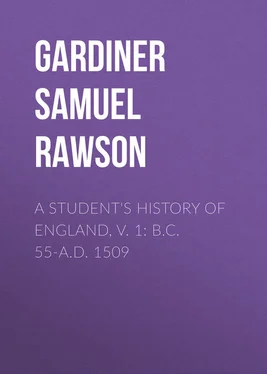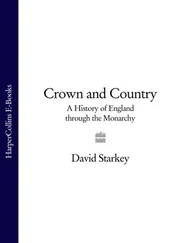Samuel Gardiner - A Student's History of England, v. 1 - B.C. 55-A.D. 1509
Здесь есть возможность читать онлайн «Samuel Gardiner - A Student's History of England, v. 1 - B.C. 55-A.D. 1509» — ознакомительный отрывок электронной книги совершенно бесплатно, а после прочтения отрывка купить полную версию. В некоторых случаях можно слушать аудио, скачать через торрент в формате fb2 и присутствует краткое содержание. Издательство: Иностранный паблик, Жанр: foreign_prose, История, foreign_antique, на английском языке. Описание произведения, (предисловие) а так же отзывы посетителей доступны на портале библиотеки ЛибКат.
- Название:A Student's History of England, v. 1: B.C. 55-A.D. 1509
- Автор:
- Издательство:Иностранный паблик
- Жанр:
- Год:неизвестен
- ISBN:нет данных
- Рейтинг книги:5 / 5. Голосов: 1
-
Избранное:Добавить в избранное
- Отзывы:
-
Ваша оценка:
- 100
- 1
- 2
- 3
- 4
- 5
A Student's History of England, v. 1: B.C. 55-A.D. 1509: краткое содержание, описание и аннотация
Предлагаем к чтению аннотацию, описание, краткое содержание или предисловие (зависит от того, что написал сам автор книги «A Student's History of England, v. 1: B.C. 55-A.D. 1509»). Если вы не нашли необходимую информацию о книге — напишите в комментариях, мы постараемся отыскать её.
A Student's History of England, v. 1: B.C. 55-A.D. 1509 — читать онлайн ознакомительный отрывок
Ниже представлен текст книги, разбитый по страницам. Система сохранения места последней прочитанной страницы, позволяет с удобством читать онлайн бесплатно книгу «A Student's History of England, v. 1: B.C. 55-A.D. 1509», без необходимости каждый раз заново искать на чём Вы остановились. Поставьте закладку, и сможете в любой момент перейти на страницу, на которой закончили чтение.
Интервал:
Закладка:
12. Eadwine's Supremacy.—Eadwine's immediate kingship did not reach further south than the Humber and the Dee. But before 625he had brought the East Angles and the kingdoms of central England to submit to his over-lordship, and he hoped to make himself over-lord of the south as well, and thus to reduce all England to dependence on himself. In 625he planned an attack upon the West Saxons, and with the object of winning Kent to his side, he married Æthelburh, a sister of the Kentish king. Kent was still the only Christian kingdom, and Eadwine was obliged to promise to his wife protection for her Christian worship. He was now free to attack the West Saxons. In 626, before he set out, ambassadors arrived from their king. As Eadwine was listening to them, one of their number rushed forward to stab him. His life was saved by the devotion of Lilla, one of his thegns, who threw his body in the way of the assassin, and was slain by the stroke intended for his lord. After this Eadwine marched against the West Saxons. He defeated them in battle and forced them to acknowledge him as their over-lord. He was now over-lord of all the English states except Kent, and Kent had become his ally in consequence of his marriage.
13. Character of the later Conquests.—Eadwine's over-lordship had been gained with as little difficulty as Æthelberht's had been. The ease with which each of them carried out their purpose can only be explained by the change which had taken place in the condition of the English. The small bodies of conquerors which had landed at different parts of the coast had been interested to a man in the defence of the lands which they had seized. Every freeman had been ready to come forward to defend the soil which his tribe had gained. After tribe had been joined to tribe, and still more after kingdom had been joined to kingdom, there were large numbers who ceased to have any interest in resisting the Welsh on what was, as far as they were concerned, a distant frontier. Thus, when Ceawlin was fighting to extend the West Saxon frontiers in the valley of the Severn, it mattered little to a man whose own allotted land lay on the banks of the Southampton Water whether or not his English kinsmen won lands from the Welsh near Bath or Gloucester. The first result of this change was that the king's war-band formed a far greater proportion of his military force than it had formed originally. There was still the obligation upon the whole body of the freemen to take arms, but it was an obligation which had become more difficult to fulfil, and it must often have happened that very few freemen took part in a battle except the local levies concerned in defending their own immediate neighbourhood. A military change of this kind would account for the undoubted fact that the further the English conquest penetrated to the west the less destructive it was of British life. The thegns, or warriors personally attached to the king, did not want to plough and reap with their own hands. They would be far better pleased to spare the lives of the conquered and to compel them to labour. Every step in advance was marked by a proportionately larger Welsh element in the population.
14. Political Changes.—The character of the kingship was as much affected by the change as the character of the population. The old folk-moots still remained as the local courts of the smaller kingdoms, or of the districts out of which the larger kingdoms were composed, and continued to meet under the presidency of ealdormen appointed or approved by the king. Four men and a reeve, all of them humble cultivators, could not, however, be expected to walk up to York from the shores of the Forth, or even from the banks of the Tyne, whenever Eadwine needed their counsel. Their place in the larger kingdoms was therefore taken by the Witenagemot ( The moot of the wise men ), composed of the ealdormen and the chief thegns, together with the priests attached to the king's service in the time of heathendom, and, in the time of Christianity, the bishop or bishops of his kingdom. In one way the king was the stronger for the change. His counsellors, like his fighting force, were more dependent on himself than before. He was able to plan greater designs, and to carry out military enterprises at a greater distance. In another way he was the weaker for the change. He had less support from the bulk of his people, and was more likely to undertake enterprises in which they had no interest. The over-lordships of Æthelberht and Eadwine appear very imposing, but no real tie united the men of the centre of England to those of Kent at one time, or to those of North-humberland at another. Eadwine was supreme over the other kings because he had a better war-band than they had. If another king appeared whose war-band was better than his, his supremacy would disappear.
15. Eadwine's Conversion and Fall.—In 627Eadwine, moved by his wife's entreaties and the urgency of her chaplain, Paulinus, called upon his Witan to accept Christianity. Coifi, the priest, declared that he had long served his gods for naught, and would try a change of masters. 'The present life of man, O king,' said a thegn, 'seems to me in comparison of that time which is unknown to us like to the swift flight of a sparrow through the room wherein you sit at supper in winter, with your ealdormen and thegns, and a good fire in the midst, and storms of rain and snow without.... So this life of man appears for a short space, but of what went before or what is to follow we are utterly ignorant. If therefore this new doctrine contains something more certain, it seems justly to deserve to be followed.' On this recommendation Christianity was accepted. Paulinus was acknowledged as Bishop of York. The new See, which had been originally intended by Pope Gregory to be an archbishopric, was ultimately acknowledged as such, but as yet it was but a missionary station. Paulinus converted thousands in Deira, but the men of Bernicia were unaffected by his pleadings. Christianity, like the extension of all better teaching, brought at first not peace but the sword. The new religion was contemptible in the eyes of warriors. The supremacy of Eadwine was shaken. The men of East Anglia slew their king, who had followed his over-lord's example by accepting Christianity. The worst blow came from Mercia. Hitherto it had been only a little state on the Welsh border. Its king, Penda, the stoutest warrior of his day, now gathered under him all the central states, and founded a new Mercia which stretched from the Severn to the Fens. He first turned on the West Saxons, defeated them at Cirencester, and in 628brought the territory of the Hwiccas under Mercian sway. On the other hand, East Anglia accepted Eadwine's supremacy and Christianity. Penda called to his aid Cædwalla, the king of Gwynnedd, the Snowdonian region of Wales. That he should have done so shows how completely Æthelfrith's victory at Chester, by cutting the Kymric realm in two, had put an end to all fears that the Kymry could ever make head against England as a whole. The alliance was too strong for Eadwine, and in 633, at the battle of Heathfield—the modern Hatfield, in Yorkshire—the great king was slain and his army routed.
16. Oswald's Victory at Heavenfield.—Penda was content to split up Bernicia and Deira into separate kingdoms, and to join East Anglia to his subject states. Cædwalla had all the wrongs of his race to avenge. He remained in North-humberland burning and destroying till 635, when Oswald, who was a son of Æthelfrith and of Eadwine's sister, and therefore united the claims of the rival families, gathered the men of Bernicia round him, overthrew Cædwalla at Heavenfield, near the Roman Wall, and was gratefully accepted as king by the whole of North-humberland.
Читать дальшеИнтервал:
Закладка:
Похожие книги на «A Student's History of England, v. 1: B.C. 55-A.D. 1509»
Представляем Вашему вниманию похожие книги на «A Student's History of England, v. 1: B.C. 55-A.D. 1509» списком для выбора. Мы отобрали схожую по названию и смыслу литературу в надежде предоставить читателям больше вариантов отыскать новые, интересные, ещё непрочитанные произведения.
Обсуждение, отзывы о книге «A Student's History of England, v. 1: B.C. 55-A.D. 1509» и просто собственные мнения читателей. Оставьте ваши комментарии, напишите, что Вы думаете о произведении, его смысле или главных героях. Укажите что конкретно понравилось, а что нет, и почему Вы так считаете.












